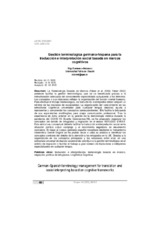Mostrar el registro sencillo del ítem
Gestión terminológica germano-hispana para la traducción e interpretación social basada en marcos cognitivos
| dc.contributor.author | Koreneva-Antonova, Olga | |
| dc.date.accessioned | 2024-01-22T11:01:33Z | |
| dc.date.available | 2024-01-22T11:01:33Z | |
| dc.date.issued | 2023 | |
| dc.identifier.issn | 2255-3703 | |
| dc.identifier.uri | http://hdl.handle.net/10396/26641 | |
| dc.description.abstract | La Terminología Basada en Marcos (Faber et al. 2006; Faber 2022) pretende facilitar la gestión terminológica, que se ve beneficiada gracias a la estructuración adecuada del conocimiento especializado subyacente a los términos. Los conceptos y sus relaciones reflejan la organización del lexicón mental humano. Para efectuar el trabajo terminológico, los traductores e intérpretes deben adquirir un mínimo de las nociones de especialidad. La organización del conocimiento en las estructuras cognitivos universales para cualquier lengua (marcos) ayuda a representar y comprender los conceptos correspondientes. Ello facilita la búsqueda de sus equivalentes multilingües para mejor comunicación profesional. Tras la experiencia de éxito anterior en la gestión de la terminología médica durante la pandemia del COVID-19 (Evento Coronavirus-19), se ha propuesto organizar los conceptos del ámbito de refugiados y migración en el marco REFUGEE EVENT. Esta estructura conceptual debería facilitar la traducción e interpretación social en la situación política actual compleja y el movimiento migratorio en movimiento constante. En base al corpus germano-español recopilado mediante la herramienta informática Sketch Engine se ha podido llevar a cabo su análisis e identificar los conceptos centrales del ámbito de la atención a los refugiados en la UE. Gracias a la organización de los conceptos principales y las relaciones entre ellos en una estructura universal de marcos se pretende contribuir a la gestión terminológica en el ámbito de migración y facilitar el trabajo a gran número de traductores e intérpretes especializados en cualquier lengua. | es_ES |
| dc.description.abstract | Frame-Based Terminology (Faber et al. 2006; Faber 2022) aims to facilitate terminology management, which benefits from the appropriate structuring of the specialised knowledge underlying the terms. Concepts and their relationships reflect the organisation of the human mental lexicon. In order to carry out terminological work, translators and interpreters must acquire a minimum of specialised notions. The organisation of knowledge into universal cognitive structures for any language (frameworks) helps to represent and understand the corresponding concepts. This facilitates the search for their multilingual equivalents for better professional communication. Following the previous successful experience in the management of medical terminology during the COVID-19 pandemic (Coronavirus-19 Event), it has been proposed to organise the concepts in the refugee and migration field in the REFUGEE EVENT framework. This conceptual structure should facilitate social translation and interpretation in the current complex political situation and the constantly moving migration movement. On the basis of the German-Spanish corpus compiled using the Sketch Engine software tool, it was possible to analyse the corpus and identify the core concepts in the field of refugee care in the EU. By organising the main concepts and the relationships between them in a universal framework structure, the aim is to contribute to terminology management in the field of migration and to facilitate the work of a large number of translators and interpreters specialised in any language. | es_ES |
| dc.format.mimetype | application/pdf | es_ES |
| dc.language.iso | spa | es_ES |
| dc.publisher | UCOPress | es_ES |
| dc.rights | http://creativecommons.org/licenses/by/3.0/es/ | |
| dc.source | Skopos 14, 89-102 (2023) | es_ES |
| dc.subject | Traducción e interpretación | es_ES |
| dc.subject | Terminología basada en marcos | es_ES |
| dc.subject | Migración | es_ES |
| dc.subject | Política de refugiados | es_ES |
| dc.subject | Lingüística Cognitiva | es_ES |
| dc.subject | Translation and interpreting | es_ES |
| dc.subject | Frame-Based Terminology | es_ES |
| dc.subject | Migration | es_ES |
| dc.subject | Refugee policy | es_ES |
| dc.subject | Cognitive Linguistics | es_ES |
| dc.title | Gestión terminológica germano-hispana para la traducción e interpretación social basada en marcos cognitivos | es_ES |
| dc.title.alternative | German-Spanish terminology management for translation and social interpreting based on cognitive frameworks | es_ES |
| dc.type | info:eu-repo/semantics/article | es_ES |
| dc.relation.publisherversion | https://www.uco.es/ucopress/ojs/index.php/skopos/index | es_ES |
| dc.rights.accessRights | info:eu-repo/semantics/openAccess |

